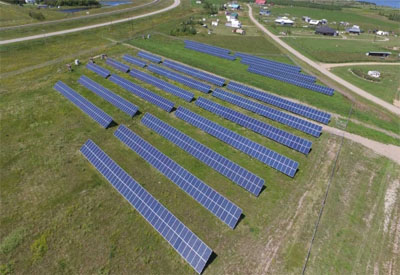Solar Self-Sufficiency Possible, But Not Feasible in Coastal B.C., Researchers Find

December 20, 2017
Complete electrical self-sufficiency via solar power is technically feasible in Western Canada, according to a team of B.C. researchers — but economics and geography make it an unlikely proposition.
Researchers from the University of Victoria’s Pacific Institute for Climate Solutions crunched the numbers on what would be required for the average Victoria household to be completely self-sufficient through photovoltaic (PV) electricity generation and storage.
The team found that, while the technology exists, costs are prohibitive and the weather — particularly winter cloud cover — presents significant barriers.
“We thought, this is a great example for us to simply run some of the numbers and show people what’s truly required to cut the cord from the electricity grid,” said Bryson Robertson, an adjunct professor at UVic.
“The task, if one was purely going to meet it with PV solar panels and batteries, is fairly monumental.”
According to the team’s calculations, the average Victoria home would need 120 square metres of PV panels and storage capacity equal to 131 Tesla Powerwall batteries. A single Powerwall costs about $9,000. For most people, Robertson said, that’s just too much of an investment up front.
“You’re looking at spending a million dollars purely in batteries, not to even speak to the PV costs,” he said.
An alternative, the team suggests, would be a smaller storage system of only 21 Powerwalls, but that would require 300 square metres of PV panels — slightly larger than a tennis court.
The team’s calculations assume a house is heated with natural gas and its residents drive gas- or diesel-powered vehicles. The cost would be even higher to run electric baseboard heating or electric vehicles.
The main challenge, Robertson said, is that B.C.’s West Coast tends to be shrouded in cloud for much of the winter which is the peak season for electrical demand. The northerly latitude also means days are shorter and solar radiation is less intense.
In comparison, places like California and Arizona are sunny all year round and demand is highest in the summer when power generation is at its peak, making solar more viable.
The team also compared the Victoria house’s requirements to those of an average Calgarian house. Calgary is slightly further north, meaning shorter winter daylight hours, but Albertan winters tend to be much sunnier. That means smaller storage requirements: 61 Powerwalls with a 90-square-metre PV system. But Robertson is less interested in the numbers themselves than in why people want to go off the grid in the first place.
He says energy self-sufficiency is an admirable goal for its own sake, but if the goal is primarily to reduce greenhouse gas emissions, it might not be worth it. In B.C., he notes, power comes mostly from hydroelectric sources which are already “clean” — that is, renewable and emissions-free.
But much of the North American power grid still runs on coal and other fossil fuels, which means switching to solar would have a bigger net impact on emissions in those areas.
“There is an opportunity for us to have a sort of collective self-sufficiency,” Robertson said.
“If we broaden our geographic scope, there’s an opportunity for us to … generate from variable resources in the places where they are best suited to do it.”
Originally published in CBC: http://www.cbc.ca/news/canada/british-columbia/solar-self-sufficiency-not-feasible-1.4427770











![Guide to the Canadian Electrical Code, Part 1[i], 26th Edition– A Road Map: Section 56](https://electricalindustry.ca/wp-content/uploads/2022/11/Guide-CE-Code-2.png)



